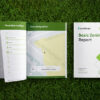
 Use GeoWarehouse to mitigate real estate fraud
Use GeoWarehouse to mitigate real estate fraud
Real estate fraud is common and emerges in a few different forms. According to CPA Canada the most common forms of real estate fraud are foreclosure fraud, title fraud and mortgage fraud. Knowing the patterns that fraudsters follow and arming yourself with the proper tools and data are the best ways to combat real estate fraud.
Using GeoWarehouse helps you ensure a client hasn’t omitted any information and is key in protecting yourself from real estate fraud. Below are some examples of data you can use to detect fraud:
Sales history
- Ownership: ensuring your client(s) are the only legal homeowner(s) is critical to mitigating real estate fraud. Are there other individuals or corporations listed on title that your client(s) have not disclosed? If so, you might need to do a bit more research. Accessing a simple title search early in the process to check ownership information can save you a lot of headaches.
- Timing of registrations: if there are a high number of transactions in a short period of time, this can prompt questions that you may want to ask about the reasons for the frequency of the changes, especially if the transfers are not arm’s length.
- Value: too many transfers over a short period of time with significant changes in value may suggest more investigation is required.
Parcel Register
- A Parcel Register provides insight into the full provincial title record and shows all encumbrances that may affect equity, land use and ownership. Perhaps there are undisclosed mortgages or liens affecting title or mortgage amounts that are higher than the value of the property. These are some observations that may prompt further investigation.
While most clients aren’t actively trying to commit fraud, validating information helps you better understand the deals you’re working on and guide your client through any challenges that could arise.
To get more information throughout Fraud Prevention Month, follow us on LinkedIn, Twitter and Facebook.







